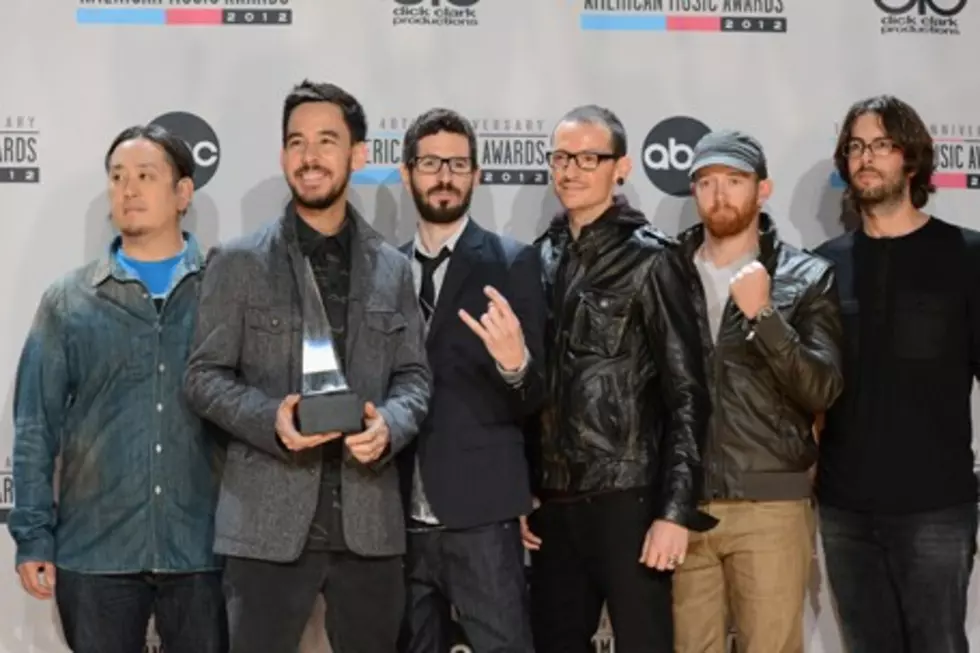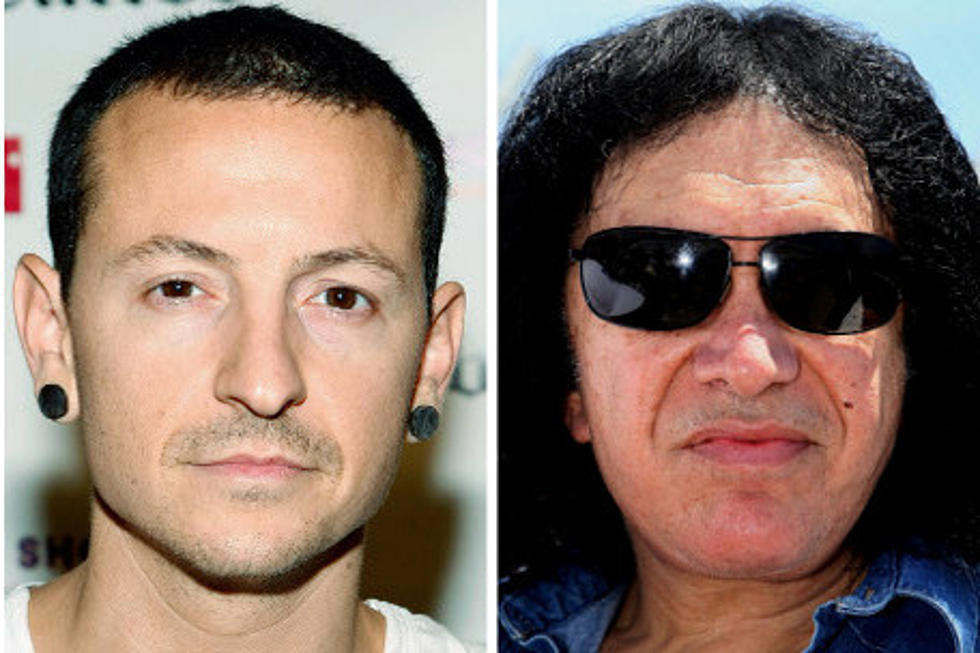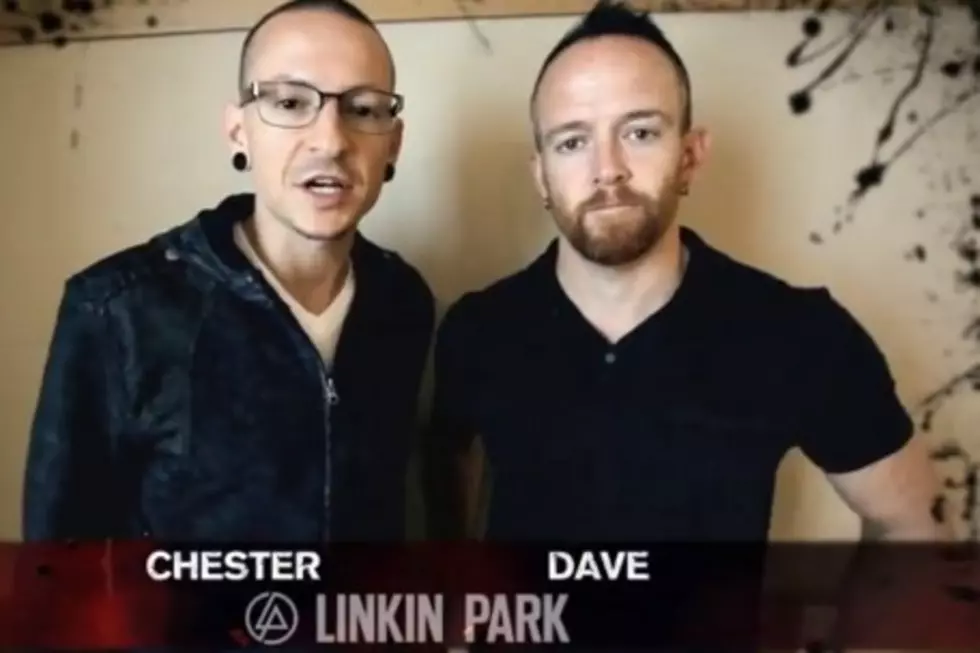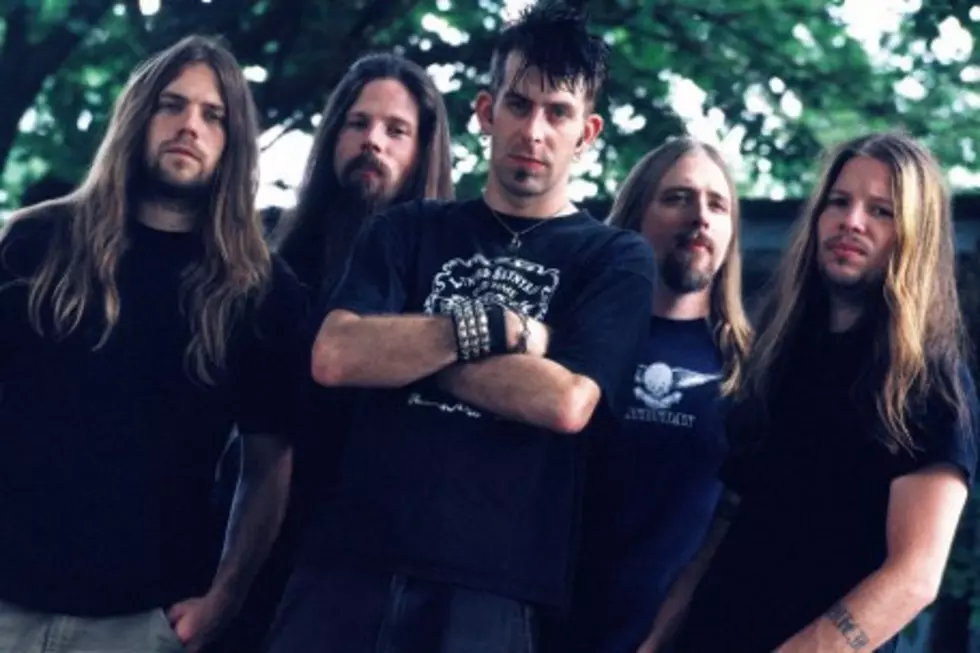
Linkin Park Drop the Bomb, Revel in the Aftermath of ‘A Thousand Suns’
First the good news: Linkin Park's fourth album, 'A Thousand Suns,' is refreshingly creative, thematically intriguing and sonically bleak. Instead of returning to the rap metal formula that has proved successful for most of their career, they've gone even further into the introspective alternative zone they explored on 2007's 'Minutes to Midnight,' an album that owed as much to U2 as to Nine Inch Nails.
Indeed, for hard rock fans who enjoyed the metallic angst of songs like 'Crawling,' 'In the End' and 'Somewhere I Belong,' 'A Thousand Suns' might not provide enough headbang for the buck. While Linkin Park create layers of tension with keyboards, samples and drum machines, the guitars take a back seat to the electronic wizardry and when the guitars surface in the mix they're hardly ever distorted. Still, if you can overlook the fact that this isn't really a metal album, it may just be the most interesting, complex and consistent album of the band's career. And while the sound isn't metal, the attitude sure is -- completely breaking from convention and commercialism at a time when landing a platinum album is as rare as finding a Hollywood movie without a happy ending.
%VIRTUAL-globalVideoEmbed-{"videoIds":"517721723","width":"476","height":"357"}%
%VIRTUAL-globalVideoEmbed-{"videoIds":"517721722","width":"476","height":"357"}%
Noisecreep talked to Linkin Park vocalists Chester Bennington and Mike Shinoda about the messages they wanted to get across with 'A Thousand Suns,' their journey to avoid safe and predictable sounds, the importance of albums versus singles, and how, no matter how hard life can be, in the end it does really matter.
The title 'A Thousand Suns' seems like a reference to a quote by the inventor of the atomic bomb, Robert J. Oppenheimer. He was quoting the Hindu devotional poem the Bhagavad-Gita: "If the radiance of a thousand suns were to burst at once into the sky/ That would be like the splendor of the Mighty One/I am become Death, the shatterer of worlds."
Mike Shinoda: Actually, 'A Thousand Suns' was a lyric in the song 'The Catalyst' before it was an album title, before we even knew where it came from. One thing about this record is that a lot of the lyric writing and song writing was more intuitive than it has been in the past. We just let ourselves open to whatever ideas came up, and in the context of that particular song, 'The Catalyst,' the ideas were flowing and we weren't really editing them down. "Let them burn inside the fires of a thousand suns" was a line, then we looked it up and found all the different reference points. And it kind of pointed us in the direction of that.
Does it sometimes feel like these happy accidents were meant to be?
Chester Bennington: I think there were definitely a lot of happy coincidences when making this record, especially lyrically. Musically, I think it's a lot easier to get focused and hone in on something that you hear in your head. And you can kind of create that, and you know you might have a familiarity with the equipment that's around you, so you know how to accomplish getting that thing that's going on in your head out. Whereas, when it comes to lyrics, especially lyrics that have these pretty intense themes, going into those things with premeditation can often times result in something that doesn't really come across very honestly or can kind of feel contrived. And so when it came to the lyrics on this record and the themes and how they tie in and out of each other, it really had more to do with that kind of magical coincide. Tom Petty once said, 'The songs are already written' and I believe part of that is really true. It feels at times like we are tapped into something that's already there. We just kind of hear it first, you know?
What are some of the themes and ideas that you're trying to present in this album?
Mike Shinoda: When we were writing 'A Thousand Suns,' we did some interviews where we called it a concept record 'cause at the time I think we were thinking that's what we might be doing.
Chester Bennington: It was a sexy idea, making a concept record. It felt challenging and we wanted to challenge ourselves, so that was appealing. And then we realized very quickly that would put a lot of our creativity into a single box and kind of work against the free flowing ideas that we had.
Mike Shinoda: When people think of concept records, I think they think of things with a specific narrative -- almost like a rock opera or something that tells a singular story with a conflict and a resolution. We just felt like that would be a little restraining. So we decided that we'd just let it be about the concepts that we wanted to talk about, and be a little more abstract and loose.
The Oppenheimer soundbite and a lot of the steely electronic samples give the music an apocalyptic feel. Were you striving to create something bleak and barren sounding?
Chester Bennington: We tend to lean more towards the dark feeling of music. We like distracting sounds and hard beats. And we talk about loss and self worth and we've gotten really comfortable talking more about things that are happening throughout our lives and in the world that are very aggressive and conflict-driven -- how interpersonal conflicts relate to the outside world and vice versa. Themes of death, forgiveness, holding on to your dreams, being depressed, all of those things are talked about in one way or another on the record. For me, the lyrics that we write are evoked by the nature of the music or melody. We tend to go with more aggressive sounding music in some places, and then really nice, beautiful, optimistic sounding parts in others. Our producer Rick Rubin came into our very early listenings and said, "There's this really great post-apocalyptic vibe to what I'm hearing" and we were like, "Oh, cool." That was attractive to us to and when he said, "That's working," we were like, "We'll run with that."
Mike Shinoda: It's hard to remember all the little moments that make up a record. As you listen back to it, different ones come to mind, especially on a record like this that worked on it for two years. It's built upon so many different moments of inspiration and so many things that were happening at the time, be they personal things or things we read online or in the news. Sonically, it's a dense record, but I think conceptually it is, too. And I think the songs are more three-dimensional because they were written over the longer time period. But it's not just about dark things. It's not just about fear and loss. There's more hope on this record then there has ever been on a Linkin Park record. And if you listen to it, It's complicated because that's who we are as people and we wanted to hopefully capture some of that in the music and the lyrics.
Can you elaborate on some of the pivotal points either in your life or in the world that were very influential and that made their mark on this album?
Mike Shinoda: Well, I think one thing that we're trying to be careful about with this record is to let people know it's not intended to be a preachy record. We're not talking about specific events in the world, social events, political events, even things in our own lives because we kept coming back to the songs over and over in the course of years and each time we came back to them we were in a different mind frame. Although a song may have started off being about ... oh I don't know, post apartheid unrest, you come back to it thinking about some personal stuff that happened to you in the day, then you kind of apply that mind state in there as well. So I don't want people to walk away from this record feeling preached to, I want them to walk away with their own questions and relating to it in their own way.
You talked about how there's more hope on this record than heartbreak. Are you saying that through all this conflict and all these troubled times, we're strong enough to survive, and what doesn't kill us makes us stronger?
Chester Bennington: We definitely touch on these pretty dark experiences, but at the same time we've also been about to experience some really great things in our lives. There is a constant to every one of these great moments, and that is hanging on to your dreams, knowing that there's someone out there who cares about you. And in spite of all this craziness that seems to happen in life and in the world, there are good things that happen as well, and I think that's something we found a way to throw into these songs. I was writing 'Messenger' as a letter to my kids. I was saying that eventually you're going to go out into the world and find out it's challenging out there, but just remember there's always a place for you where you are accepted for who you are and you're loved for all the things that make you who you are. I think that's really important and I think it helps get us through this craziness that we live in.
Musically, 'A Thousand Suns' is challenging and experimental. You use lots of computerized noises, textures, and layering. Production-wise it seems like the vibes range from old-school Run-DMC style drum machine beats to some really contemporary electronic beats. Was the intent to throw caution to the wind and see what happens?
Mike Shinoda: Ten years ago we had a had a certain musical vocabulary. Then another 10 years go by, the vocabulary gets bigger, so we're no longer talking about using the same ideas to express what we want. It's a little more three-dimensional. If your gonna use a hip-hop beat in something, then what kind of beat are we talking about? Is it something current, is it something futuristic, is it something tribal, something West Coast, East Coast, '80s, '90s, you know? There are all kinds of different ways to go about it, and that's just one example. Today's society is deeply connected by and through technology and you cant avoid that when you're making an album. There are just so many ways to do things now, so many ways to make a sound that it's no longer a challenge to find the right sound. It's a challenge to sort through the noise and the mess to decide which things your not going to use. Maybe it's a matter of looking at the broader picture. I mean that's true in every day life as well. Like, when we go on the Internet, we're looking for someone to help filter out the garbage and the noise and give us what we really want to find, whether that be the news or something that our friends send us -- a YouTube video or something. There's a conflict there and I feel like this record is partially built upon that state of mind and that anxiety.
Chester Bennington: Yeah, we definitely, definitely consciously went in thinking lets not go with the rule book that we normally go with. We're not going to worry about arrangements that work for the radio, we're not going to fall back on the same tricks we've used in the past to make a song. We definitely stopped worrying about what critics say about the band -- a long time ago. Our fans are so broad and different from each other that to make a record that suits each person the way they want Linkin Park to be, it's impossible. We really just want to make music that excites us and gets us feeling like we're doing something important or different from anything we've done before, and that feels like we've challenged ourselves in a way that is honest and not safe. When something feels safe, we kind of get this "eww gross" feeling regardless of how nice it sounds because we want to challenge our fans and we want to take people on this journey with us. Some people are going to come on board now. Perhaps they weren't Linkin Park fans before and some of our fans are gonna want to stay on 'Hybrid Theory' and put their middle finger up to everything else that we do, and that's fine. We embrace all the stuff that we've done in the past. We just don't want to become caricatures of ourselves and keep trying to regurgitate the glory days, we want to stay present in what we're doing.
Mike Shinoda: And create a new glory.
You said you wanted to avoid the safe route, and one of the safest things in loud music, of course, is the use of distorted guitars and power chords. On this record it seems you've really taken a active effort to remove or not use those kinds of traditional metal riffs.
Chester Bennington: The easiest way to sound like something you've done before is to fall back on the same old tricks. OK, we want a big rock chorus that's got a big melody and good lyrics that really hits you. Obviously, distorted guitar is the first thing you go to.
Mike Shinoda: You can break it down even simpler, If you want to make that song then let's put sample drums in the verses, lets do a verse chorus, bridge chorus structure, let's put in 'Hybrid Theory' guitar harmonics through light distortion in the verses. And let's put power chords in the chorus. It got to the point that it was so stupid simple we felt like we can do that with our eyes shut. It's something we did forever and we don't need to do that anymore. In fact, when the songs came up that were really the opposite of that and were really different -- the times that the guys in the band heard the demo and went, "I don't even know if I like it or hate it 'cause it's so different it scrambles my brain" -- those were the moments that were really exciting for all of us. Even if I decided that's a little too weird and I don't like it, it was still a moment that straightened out our course to let us know where we were at.
Chester Bennington: It kept us in the place, knowing, "OK, we can be aggressive without being metal and we can be rock without being, you know obvious. And we can be hip-hop and not be cliché. And we can do all those things in a way that still sounds very Linkin Park because we've always used electronics in our music." It just seemed like we flipped things around a little bit this time. All those things that were textural in the past with the beeps, and the pops and the beats came really to the forefront, whereas a lot of the things like strings and guitars and piano fell back and became more textural.
Some critics have compared this album to Radiohead's 'Kid A,' which is a strong compliment. They had a formula, they mastered the kind of textural atmospheric guitar rock they helped pioneer, and then they went off into left field. Were they an influence for 'A Thousand Suns' or were there other artists you were listened to that inspired your creativity?
Mike Shinoda: One thing we found with this record was that writers and critics who never have been particularly positive about the band are coming around to some degree. It's kind of shocking to us and we welcome it, obviously.
Chester Bennington: I've gotten use to getting two-star reviews [laughs].
Mike Shinoda: So to start getting five-star reviews on the record was surprising to a lot of us. At the same time, we can't base our self-worth or the worth of our band on that stuff. It just wouldn't be healthy. For us to make a record that we feel like we challenged ourselves and we potentially got better as musicians and as writers, that's a big deal for us.
Chester Bennington: I think also our willingness to really create our own sounds and use them in ways and in patterns rhythmically that kind of throws you off a little bit [is a big accomplishment for us on this album. Also, we were graciously allowed to use speeches by Mario Savio, Martin Luther King and Robert Oppenheimer and that really create this seamless experience that is meant to be listened to from beginning to end. We intentionally wanted to take people out of what they were doing and transport them to something else, some other place.
Mike Shinoda: And we know it's challenging, because we all listen to music in little bite-sized pieces now. But when we were kids we used to listen to records in vinyl and cassette, and you just put it on and listened to the whole thing and got that whole experience. As unpopular as it is right now to do that, we wanted to make a case for that at this point in time. Also, I feel like a lot is made of the fact that we had a sound that people recognized as our thing, and in the past few years we've gone pretty far away from that. I think [that] we want our fans, and people that do know that old sound and love that old thing is, to know that we're not closing the door on them. We're not saying that just because we're making something that sounds different that they're uncool now. When you come to our show, we play the old stuff, too, and that's just to say to them that is a moment in time and at that time we were making something to us that felt fresh, and now we're making something else that feels fresh and we just hope to continue to do that.
More From Noisecreep









